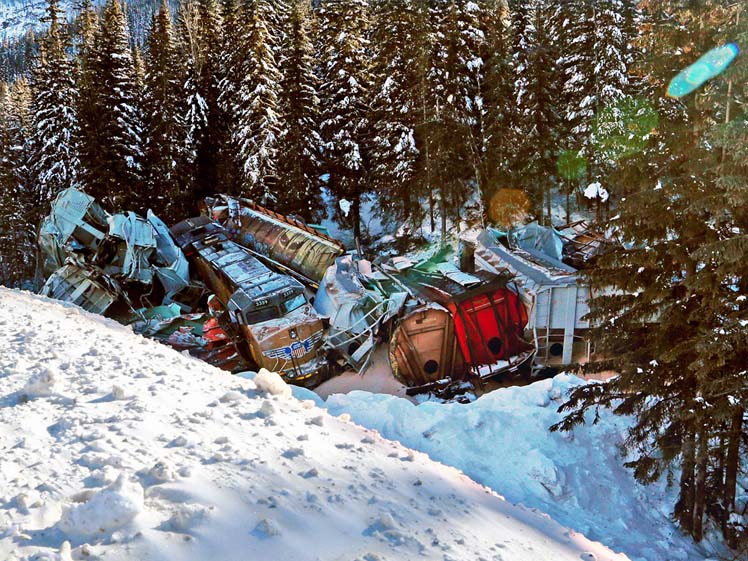
Trans-Canada Highway overpass - 4 Feb 2019 Gavin Young.
CP Workers to Start Grim Pool
Canada - Three significant derailments of CP trains in three days has renewed concerns about the safety of railway workers just a month
after a horrific crash outside Field, B.C., killed three employees.
So grim is the mood among some CP workers, that one online hub for current and past employees has launched a darkly tongue-in-cheek derailment pool, asking
players to choose the day, subdivision, mile, and train ID of a future incident, with each correct guess earning the winner 20 percent of the
kitty.
Christopher Monette, spokesman for the Teamsters Canada Railway Conference (TCRC), said tensions among unionized workers are rising, with some raising concerns
about the potentially dangerous effect of a recent stretch of bitterly cold weather on the trains.
"Workers are telling us the trains are becoming harder to control in cold weather," Monette said, particularly for locomotives operating in
especially frigid conditions and difficult terrain through the mountain passes.
"As far as members' state of mind out there, it's pretty grim, and it's shifting from concern to anger."
Monette said he's not surprised some workers may look at the current climate with dark humour, though he wasn't personally aware of the derailment
pool.
The most recent string of derailments began last Thursday, when a freight train hauling grain and empty automobile carriers left the tracks just west of the
Banff townsite at Mile 87 of the Laggan subdivision, some 70 kilometres from the deadly crash near Field on 4 Feb 2019 that killed conductor Dylan Paradis,
engineer Andrew Dockrell, and trainee Daniel Waldenberger-Bulmer, all from Calgary.
A day after the incident in Banff, more than two dozen cars of a CP train carrying grain and potash derailed just south of Carlos, Minnesota, and on Saturday,
a handful of cars carrying diesel and grain left the rails as they crossed a bridge over the Kicking Horse River, though none of their contents
spilled.
There were no injuries in any of the derailments.
Monette said another potential catastrophe was narrowly avoided last Monday on the same stretch of track through the Spiral Tunnels that killed the three
workers last month, when the engineer of a 109 car grain train had to apply the emergency brakes to stop the westbound locomotive that had lost
control.
In a statement, CP spokeswoman Salem Woodrow said cold weather continues to be a challenge and the railway adjusts based on the situation, with a focus on
safety of both the workers and the communities through which trains travel.
"Prolonged extreme-cold weather across much of CP's service area continues to be a challenge. As set out in CP's Winter Operating Plan, CP makes
operational adjustments to address extreme-cold temperatures," she said.
"CP remains focused on the safety of our employees, customer's goods, the environment, and the communities we operate in and through. CP takes each
incident extremely seriously and conducts a full investigation in each instance."
The company declined to make anyone available to respond to questions.
Since November 2017, eight railway workers across Canada, including the three in Field, have died on the job, something union officials said should present
more than enough evidence for the need to change how the company operates.
But even after the devastating derailment in Field, Monette said there's been no action by CP.
"Since the derailment, the company hasn't made any changes to policy," he said.
"Rail safety is a matter of life and death."
Days after the fatal Field derailment, Transport Canada Minister Marc Garneau issued a ministerial order for all railway companies to use hand brakes when
trains are halted in an emergency stop on a mountain grade, a move praised by the union.
Last week, the Globe and Mail reported CP has pushed back against the new regulation, arguing the measures are too time-consuming.
A spokesman with the Transportation Safety Board (TSB) on Monday said the investigation into the Field derailment is still ongoing and there are no current
updates.
Shawn Logan.
provisions in Section 29 of the Canadian
Copyright Modernization Act.


